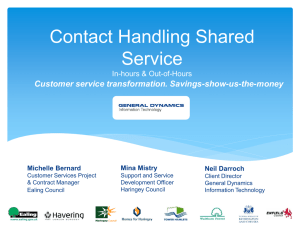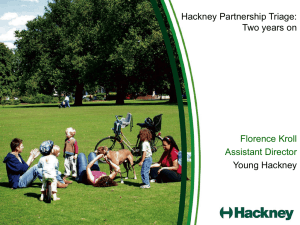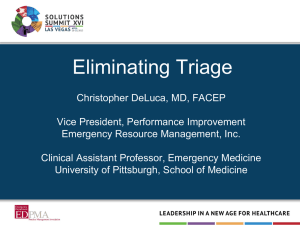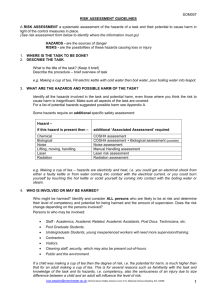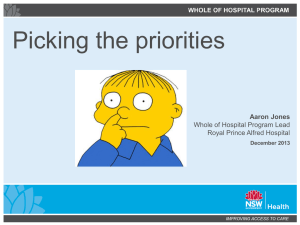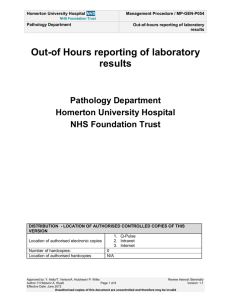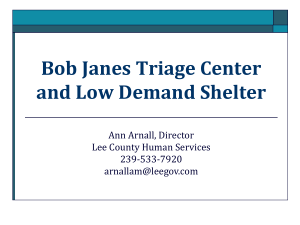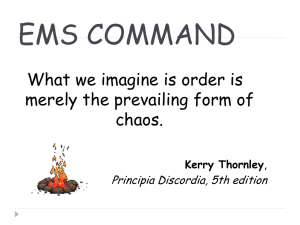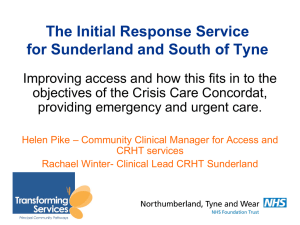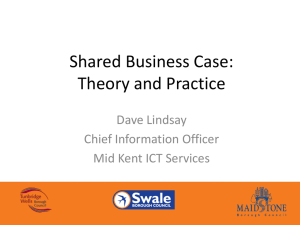Strategic Framework for GP Out-of-Hours
advertisement
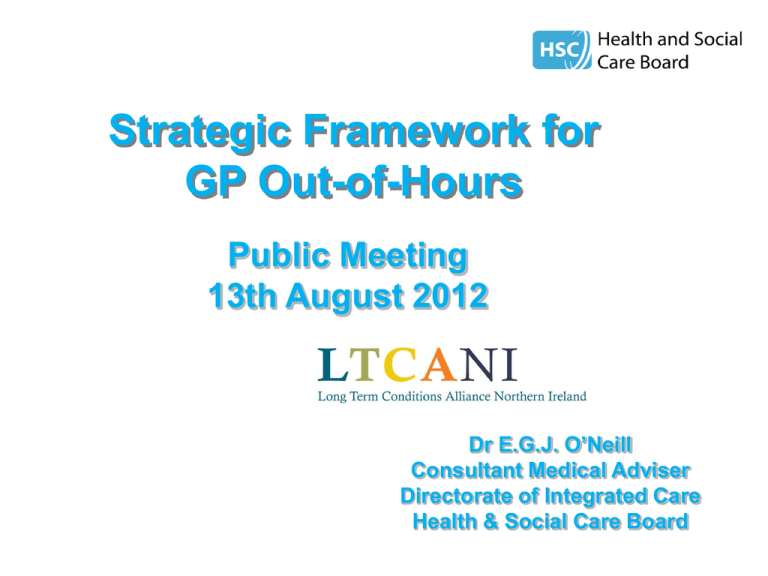
Strategic Framework for GP Out-of-Hours Public Meeting 13th August 2012 Dr E.G.J. O’Neill Consultant Medical Adviser Directorate of Integrated Care Health & Social Care Board Public Consultation Closing date – 28th September 2012 Public Meetings Outline 1. Introduction and background 2. Our plans – Strategic Framework 3. Your say Background 1. GP Out-of-Hours – for urgent primary care conditions when GP practices are closed 2. 5 provider organisations 3. Last year over 574,000 calls Call Volumes When you contact us….. Triage Immediately life-threatening: these calls should be passed to 999 ambulance within 3 minutes. Urgent: appointment given at initial contact or triage within 20 minutes by a health professional Less urgent: triage within 1 hour by a health professional Face-to-face consultation The health professional will determine if a person needs a face-to-face consultation and the appropriate timescales. A face-to-face consultation, if required, usually takes place at an Out-of-Hours centre or occasionally at a patient’s home or place of residence. Face-to-face consultation Urgent: within 1 hour if required after completion of triage. Less urgent: within 2 hours if required after completion of triage. Routine: within 6 hours if clinically appropriate after completion of triage. How do we do? How do we do? Complaints In 2011/12 – 99 complaints 574,811 contacts Complaint rate is approx 0.017% Strategic Framework 1. Simplify access to GP Out-of-Hours e.g. single telephone number 2. Improve operational efficiency 3. Improve alignment with other healthcare services Simplify access to GP Out-of-Hours Simplify access to GP Out-of-Hours Simplify access to GP Out-of-Hours reducing current telephone numbers from 7 to 1 access number consolidating the Out-of-Hours six computer systems to one regional system sharing call handling workload among call centres at busier times Simplify access to GP Out-of-Hours implementing more sophisticated telephony to manage this sharing of call handling workload improving communication with the public in terms of appropriate use of the service and how to access the service Operational efficiency continuing to develop standard protocols and processes standardising clinical governance: including best practice pathways for common presentations and performance management systems standardising the triage process, through decision support tools, agreed performance management processes, and refinement of triage processes Operational efficiency sharing triage workload across the region at busier times (calls and consultations) consolidate the number of triage centres at times of low demand e.g. overnight using technology to co-ordinate and facilitate home visits: progress towards mobile working at quieter times, where GPs travel to see patients, and Out-of-Hours centres are only opened as required for clinical consultations ensuring the service is developed in a way that best meets patients’ needs Alignment with services aligning call handling and triage processes with Northern Ireland Ambulance Service enhance collaborative working and agree protocols to facilitate the easier transfer of appropriate calls to the ambulance service transfer of appropriate “Category C” ambulance calls to the GP Out-of-Hours service Alignment with services retaining provision by local organisations of home visits to see patients, and the facility to see GPs in local Out-of-Hours centres allows for future development, to complement and align with the development of A&E (ED) and unscheduled care services retains flexibility to enable clinical provision which is responsive to local need (through Local Commissioning Groups) and to primary care providers Alignment with services considering the expansion of service provision (review interface with other services) staff and infrastructure could be used, for example, to provide a call handling service for other services such as social services contacts during the Out-of-Hours period Co-location and integration of other services would simplify and improve patient access Expected benefits Service More efficient and better quality service Better management of peaks and troughs Formal common standards Better governance Performance management Financial efficiency Development of the operating model Optimised use of workforce and centres Patient Clear patient pathway (single phone number) Removal of geographic boundaries Patient focused information Consistent processes Faster response at peak times Choice of centre to attend More coordinated joined up service Your Say Respond to the consultation Closing date – 28th September 2012 Dr Sloan Harper (GP Out-of-Hours Consultation) Health and Social Care Board 12-22 Linenhall Street Belfast, BT2 8BS E-mail: OOH.consultation@hscni.net Website: www.hscboard.hscni.net
